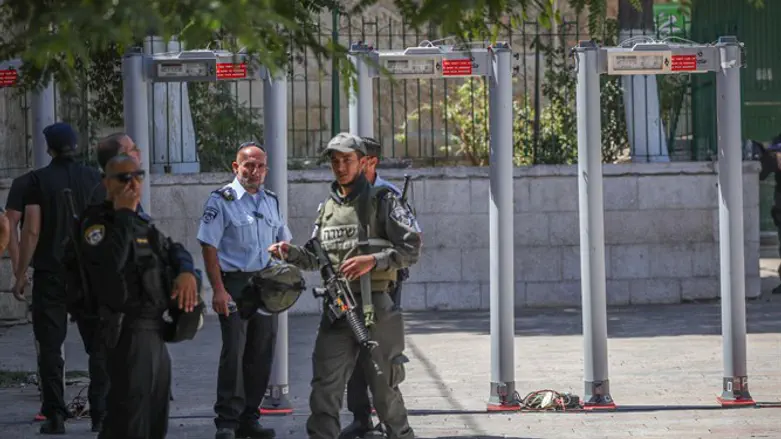
The Political-Security Cabinet decided on Thursday night, after a four-hour meeting, that the magnetometers will remain at the entrance to the Temple Mount as part of the new security measures at the compound.
The Cabinet also authorized the police to make every decision "in order to ensure free access to the holy places, while maintaining security and public order" on the Temple Mount.
"Israel is committed to maintaining the status quo on the Temple Mount and the freedom of access to the holy sites. Israel is committed to protecting the safety of all worshipers and visitors to the Temple Mount," said a statement.
Prime Minister Binyamin Netanyahu on Thursday evening held a consultation at his office in Tel Aviv to discuss the tensions at the Temple Mount.
Netanyahu convened the Cabinet immediately following the consultation in order to discuss Israel's options before Friday’s Muslim prayers at the compound.
Internal Security Minister Gilad Erdan told Channel 2 News in an interview that the metal detectors must remain on the Temple Mount because "the security interest in preventing future attacks in the wake of a desire to imitate what happened [last week] has to prevail."
"We must continue to install them (the metal detectors) on all roads to the Temple Mount. If the Shin Bet is opposed to the security measures, then it should offer alternatives, and that did not happen."
Israel decided to place magnetometers (advanced metal detectors which are selective in which metals they react to) and additional security cameras around the entrances to the holy site following last Friday’s terrorist attack at the complex, in which two Druze policemen were murdered.
These security measures prompted an outcry from the Palestinian Authority, the Jordanian Waqf and the Jordanian government, which demanded a return to the status quo. In addition, Arab rioters attacked security forces and civilian cars in eastern Jerusalem, injuring two police officers and at least one Jewish civilian on Wednesday alone.

